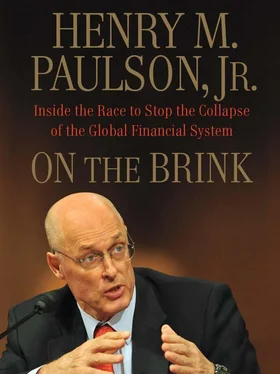I had my Friday morning breakfast with Ben Bernanke in the small conference room just off my office. He was not going up to New York but would stay in close touch. I said I was hopeful but had serious doubts about both Bank of America and Barclays. But I didn’t think any other institution had an interest or we would have heard about it.
Ben and I ran over our options for what to do if Lehman failed, but the tough fact was, we didn’t have many. As I knew all too well, and as Ben reminded me, if Lehman filed for bankruptcy, we would lose control of the process, and we wouldn’t have much flexibility to minimize market stress.
“We can only hope that if Lehman goes, the market will have had a lot of time to prepare for it,” he said.
All morning I went back and forth with Tim and Ken Lewis, encouraging Ken to make an offer. Meantime, we were still waiting to hear back from Barclays. Tim expressed concern about my public stand on government aid: he said that if we ended up having to help a Lehman buyer, I would lose credibility. But I was willing to say “no government assistance” to help us get a deal. If we had to reverse ourselves over the weekend, so be it.
In the early afternoon, I received a call from Alistair Darling, the U.K.’s chancellor of the Exchequer, with whom I had a good working relationship and who shared my views on the markets. I considered Alistair a straight shooter, and I gave him a candid update on Lehman.
“I understand one of your possible buyers is a British bank,” I remember him saying. “I want you to know that we have some concern, because our banks are already under a lot of stress. We don’t want them to become overextended and further weakened.”
Afterward I commented to Jim Wilkinson that Alistair seemed to be telling me that the British didn’t want their banks to catch the American disease. But because he couched this as a general concern, I didn’t see his words as the red flag that in retrospect they appear to have been.
I left for New York shortly before 3:00 p.m., with Dan Jester, Jim Wilkinson, and Christal West in tow, amid a grim downshift in the markets. The Dow ticked down just 12 points, but Lehman shares had declined another 13.5 percent, to $3.65. AIG’s shares dropped 31 percent for the day, ending at $12.14, and were off 46 percent for the week. I realized that I now had one more institution to put on our watch.
En route to the airport, I took a call from New York senator Chuck Schumer, who offered his views on Lehman. “We had better find a buyer who’s not going to fire a lot of people,” he said. “It would be better to have a domestic buyer than a foreign buyer.”
I wondered if Fuld, who preferred BofA, had put Schumer up to this call, but there was no question that the senator cared deeply about his state. He pointedly told me that JPMorgan’s purchase of Bear Stearns had cost New York jobs.
Tim had suggested I phone Ken Lewis to see just how serious he was. He felt, as I did, that Bank of America was drifting away. I spoke briefly with Lewis while I was on board the flight. He was trying to outline the rudiments of a proposal, but our connection was poor in the stormy weather, and I agreed to call back once we were on the ground.
I thought glumly of the challenge before us. This crisis was far greater than what we’d faced with LTCM, a decade before, almost to the day. And the circumstances were more ominous than when we saved Bear Stearns in March. The financial system, and the global economy, were in much weaker shape.
The plane touched down a little before 5:00 p.m., and I jumped into a waiting car, accompanied by Dan, Jim, and Christal. As we made our way slowly into Manhattan I got back on the phone with BofA. Lewis laid out a tentative but complex proposal. He said his people had figured that Lehman had a capital hole of about $20 billion. For BofA to buy the investment bank, it would have to leave behind $40 billion of assets. The North Carolina bank would split the first $2 billion in losses with the U.S., 49 percent to BofA and 51 percent to the government. The U.S. would have to absorb 100 percent of all other losses on the assets left behind. In return, as a modest sweetener, BofA would give the government warrants to buy its shares. I reminded him that there would be no government money but that we were bringing together a private-sector consortium, and we agreed to meet in New York to discuss the matter further.
Dan Jester followed up with a phone call to BofA’s Greg Curl to get more details. I listened to snippets of the conversation and watched Dan’s unenthusiastic reaction to what he was hearing. I had suspected that Lewis didn’t really want to buy Lehman, but I had hoped that if he believed he could get some help, he might try to pick it up on the cheap.
When Dan hung up, he shook his head. BofA had only wanted to talk about Lehman’s bad assets and the size of the valuation hole.
“It’s a positive sign that they’ve come in with the outline of an offer,” I told him. “But it sure doesn’t sound like they really want this.”
“They don’t,” Dan agreed. “But do we have anything better?”
As we slowly made our way through the heavy rain and traffic to the New York Fed’s headquarters on Liberty Street in Lower Manhattan, I checked in with Tim. He said Barclays was having trouble getting access to all the information they wanted as quickly as they needed. I wasn’t completely surprised; when I had first told Dick Fuld about Barclays’s interest he had been hesitant—he clearly preferred BofA as a buyer.
Tim thought we should press Fuld on helping Barclays. We got hold of Dick and relayed our concern. We also outlined BofA’s proposal. Dick said he didn’t understand why BofA needed any assistance. He was still clinging to his belief in the value of his assets, but he was alone there, a point underscored by a subsequent conversation I had with Varley and Diamond. The Barclays executives were encouraging, but they had one important qualifier.
“We’ve been focusing on the most problematic assets, and we may need some help with the funding,” Varley said.
He reported that he’d spoken with Barclays’s board as well as the bank’s regulator, the U.K.’s Financial Services Authority (FSA), and he believed a deal could be made.
Reassuring him again that we would not embarrass his bank, I told him we wanted his best bid right away. “Your team needs to work through the night doing due diligence,” I said. “We need as much specificity as soon as possible.”
Built in the decade before the Great Crash of 1929, the New York Federal Reserve is a Renaissance Revival fortress with iron-barred windows, hunkered amid the skyscrapers of Wall Street. Its 14 stories of offices sit atop what is said to be the biggest pile of gold in the world. I’d walked its corridors many times in my career, but never before with such a sense of urgency.
Tim had called the meeting for 6:00 p.m., but it didn’t begin until closer to 7:00 p.m., because of the bad traffic. The weather, the delay, and the market conditions contributed to a gloomy atmosphere.
Tim, Chris, and I met upstairs on the 13th floor, where Tim had taken up temporary residence while the Fed’s 10th-floor executive offices were being renovated. We quickly went through our order of presentation, then rode the elevator down to a first-floor conference room where the meeting was being held. We took our seats at a long table, where Wall Street’s most prominent CEOs sat waiting for us. Among them were Jamie Dimon from JPMorgan, John Mack from Morgan Stanley, Lloyd Blankfein from Goldman Sachs, Vikram Pandit from Citigroup, John Thain from Merrill Lynch, Brady Dougan from Credit Suisse, and Robert Kelly from Bank of New York Mellon.
It was an extraordinary moment: These were the people who controlled Wall Street and global finance. They had fought for years, sometimes bitterly, to lead their institutions to the forefront of the business, and now they had gathered to save a rival—and their own skins.
Читать дальше












